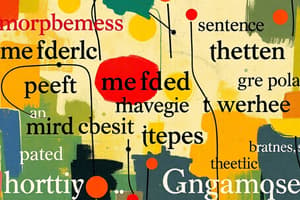Podcast
Questions and Answers
What is the smallest unit of grammar?
What is the smallest unit of grammar?
Morpheme
What type of morpheme can stand alone and has independent meaning?
What type of morpheme can stand alone and has independent meaning?
Free morpheme
What is the term for a word that has only one morpheme?
What is the term for a word that has only one morpheme?
Single morpheme/word
What is the function of lexical words in a sentence?
What is the function of lexical words in a sentence?
What is the purpose of inserts in spoken language?
What is the purpose of inserts in spoken language?
What is the main difference between inflectional and derivational suffixes?
What is the main difference between inflectional and derivational suffixes?
What is the function of a prepositional object in a sentence?
What is the function of a prepositional object in a sentence?
What is the structure of a nominal group?
What is the structure of a nominal group?
What is the difference between a definite and indefinite reference?
What is the difference between a definite and indefinite reference?
What is the function of a locative adjunct in a sentence?
What is the function of a locative adjunct in a sentence?
Flashcards are hidden until you start studying
Study Notes
Types of Grammatical Units
- A sentence consists of one or more clauses.
- A clause consists of one or more phrases.
- A phrase consists of one or more words.
- A word consists of one or more morphemes.
- A morpheme is the smallest unit of grammar.
Morphemes
- Free morphemes are independently meaningful and can stand alone.
- Bound morphemes are not independently meaningful and cannot stand alone.
- Derivatives are affixes that can be divided into prefixes (before a noun) and suffixes (after a noun).
- Examples of derivatives: hypertension (prefix), sadness (suffix).
Words
- A word can be a single morpheme or a combination of morphemes.
- Types of words:
- Single morphemes/words.
- Derived words: roots + bound morphemes.
- Compound words: more than one word.
Word Classes
- Lexical words: nouns, verbs, adjectives, and adverbs. They carry information and are stressed in speech.
- Function words: prepositions, coordinators, determiners, auxiliary verbs, and pronouns. They indicate meaning relationships.
- Inserts: used in spoken language to express emotional and discoursal meaning.
Lexical Words
- Nouns: refer to concrete physical entities and can also denote abstract entities.
- Verbs: have different forms (tense, aspect, voice) and are the central part of the clause.
- Adjectives: take inflexional suffixes and can occur as the head of the adjectival group, describing qualities of people/things.
- Adverbs: formed from adjectives adding -ly, and can occur as the head of adverbial groups, modifying adjectives or verbs.
Function Words
- Prepositions: linking words introducing prepositional groups.
- Coordinators: indicate relationships between two units.
- Determiners: precede nouns and clarify the meaning of nouns.
- Auxiliary verbs: precede the main or lexical verb in a verb phrase.
- Pronouns: fill the position of a noun or a whole noun phrase.
Inserts
- Used to express speaker's emotional response to a situation and to signal a response to what has just been said.
Inflection, Derivation, and Compounding
- Inflection: adding inflexional suffixes to create plural nouns and past tense verbs.
- Derivation: adding affixes to create nouns, adjectives, verbs, and adverbs.
- Compounding: combining two or more stems to create a new word.
Groups
- Nominal group: consists of a determiner, modifier, head, and qualifier.
- Verbal group: consists of an object, x, and a verb.
- Adjectival group: consists of a modifier, head, and qualifier.
- Adverbial group: consists of a modifier, head, and qualifier.
- Prepositional group: consists of a head and a complement.
Clauses
- Intransitive clause: consists of a subject and a verb.
- Monotransitive clause: consists of a subject, verb, and object.
- Ditransitive clause: consists of a subject, verb, indirect object, and direct object.
- Complex transitive clause: consists of a subject, verb, direct object, and prepositional object or adjunct.
Syntactic Elements
- Prepositional object: a noun or pronoun that the preposition affects.
- Object complement: a noun, pronoun, or adjective that follows a direct object.
- Locative: denotes a place.
- Adjunct: a word, phrase, or clause that can be removed without affecting the sentence.
Nominal Group
- Structure: consists of a determiner, modifier, head, and qualifier.
- Determiners: indicate which thing is being referred to.
- Types of determiners:
- Pre-determiners: all, both, half.
- Central/main: articles, demonstratives, possessives, quantifiers.
- Post-determiners: cardinal, ordinal, quantifiers.
- Types of reference:
- Definite: identity mentioned before.
- Indefinite: no identity mentioned before.
- Generic: whole class of entities.
Studying That Suits You
Use AI to generate personalized quizzes and flashcards to suit your learning preferences.




